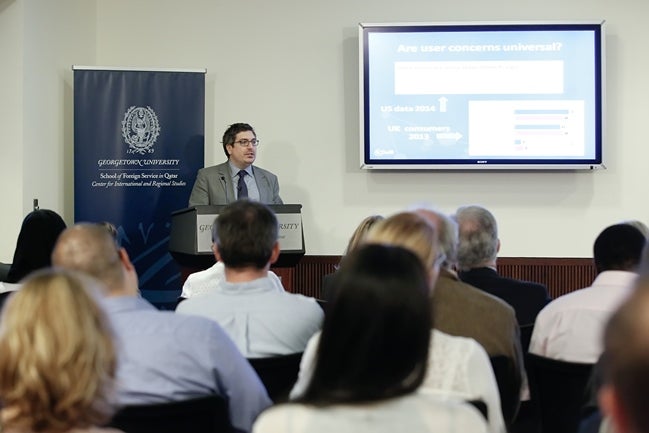Georgetown Lecture on Cybersecurity Launches First CIRS Monthly Dialogue of the Academic Year

Damian Radcliffe, who heads the Rassed research program at Qatar’s Ministry of Information and Communications Technology (ictQATAR), was recently on the campus of Georgetown University in Qatar (GU-Q) to deliver a lecture on “Attitudes to Cybersafety and Online Privacy in the Middle East” at a public lecture as part of GU-Q’s Center for International and Regional Studies (CIRS) Monthly Dialogue Series. The study’s aim is to help researchers, policy makers and others to understand the impact of emerging technologies and evolving user needs and behaviors.
“It is important to understand issues related to internet security and public attitudes toward the use and scrutiny of the internet across the MENA region. Having an expert like Damien Radcliff explore these issues for us gives us a rare opportunity to better understand the processes and consequences of the on-going communications revolution in the Middle East and elsewhere,” said Dr. Mehran Kamrava, the Director of CIRS, who introduced the guest speaker to an audience from both the university and Doha communities.
Citing a previous study, the World Economic Forum’s Global Information Technology Report which explored variations across cultures in areas such as online freedom of expression, privacy, trust and security, Mr. Radcliffe explained that “The previous report didn’t cover Middle Eastern countries, so we undertook this research project to fill the gap. This gave us an opportunity to ask questions about internet usage in the region that has never been asked before in the Middle East.”
For the report, 2,793 internet users from 14 countries across the Middle East were surveyed. This data was combined with the previous study resulting in a global sample survey of over 11,000 internet users covering nearly 60 countries. The research questions covered five areas including, usage of ICT and other technologies available in the household, attitudes towards the internet, concerns of internet users, trust in different online actors and online players, and behaviors of internet users.
The research findings indicated that despite the differences in culture, internet users in the Middle East share many of the same concerns about online privacy and safety as internet users in the rest of the world. “Equivalency in terms of technological access as a regional figure compared to the rest of the world was pretty good. In fact, if you look at the GCC, there is much higher access to advanced forms of technology than there are in many other parts of the world,”
However, Mr. Radcliffe did cite five key differences. “As compared to global users, MENA users are less likely to shop or bank online, have a more positive perception that the internet is making things better, are less worried about safety of personal online content, strongly oppose data repurposing, and have a higher desire for the Government’s role in blocking harmful online content,” Mr. Radcliffe explained.
He finished the lecture by highlighting the importance of understanding MENA internet behavior to ensure that outreach activity can be targeted to address the particular needs and anxieties of regional internet users, such as to encourage e-Government and e-Commerce activity. He also pointed out that as technology becomes even more pervasive, so will security risks. “New technologies will bring new challenges, but also new opportunities,” he concluded.
Damian Radcliffe is an award-winning content creator, journalist, and researcher who currently leads the Rassed research program at Qatar’s Ministry of Information and Communications Technology (ictQATAR)—an initiative which explores the impact of ICT on society and the potential afforded by emerging technologies.